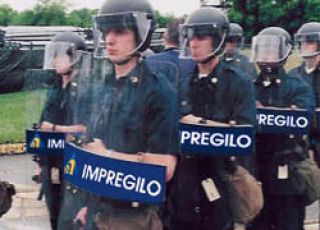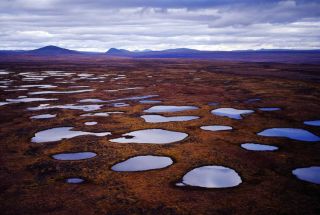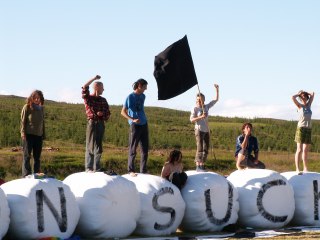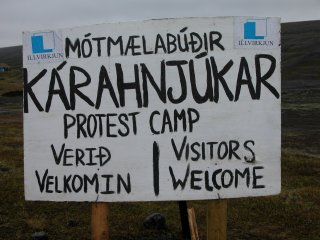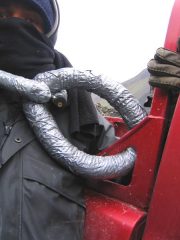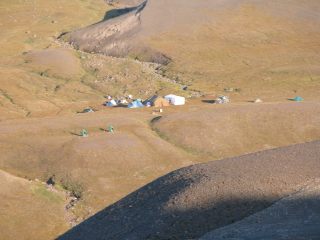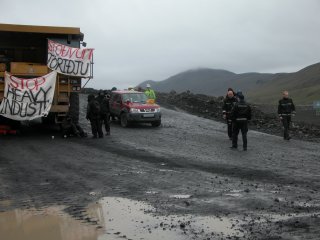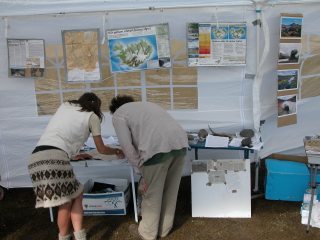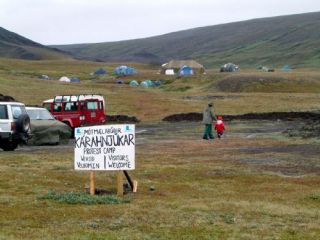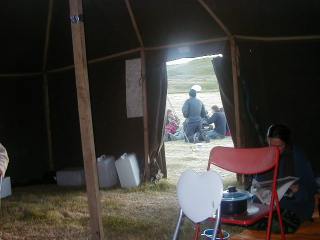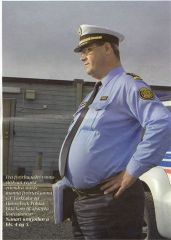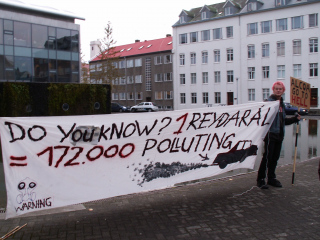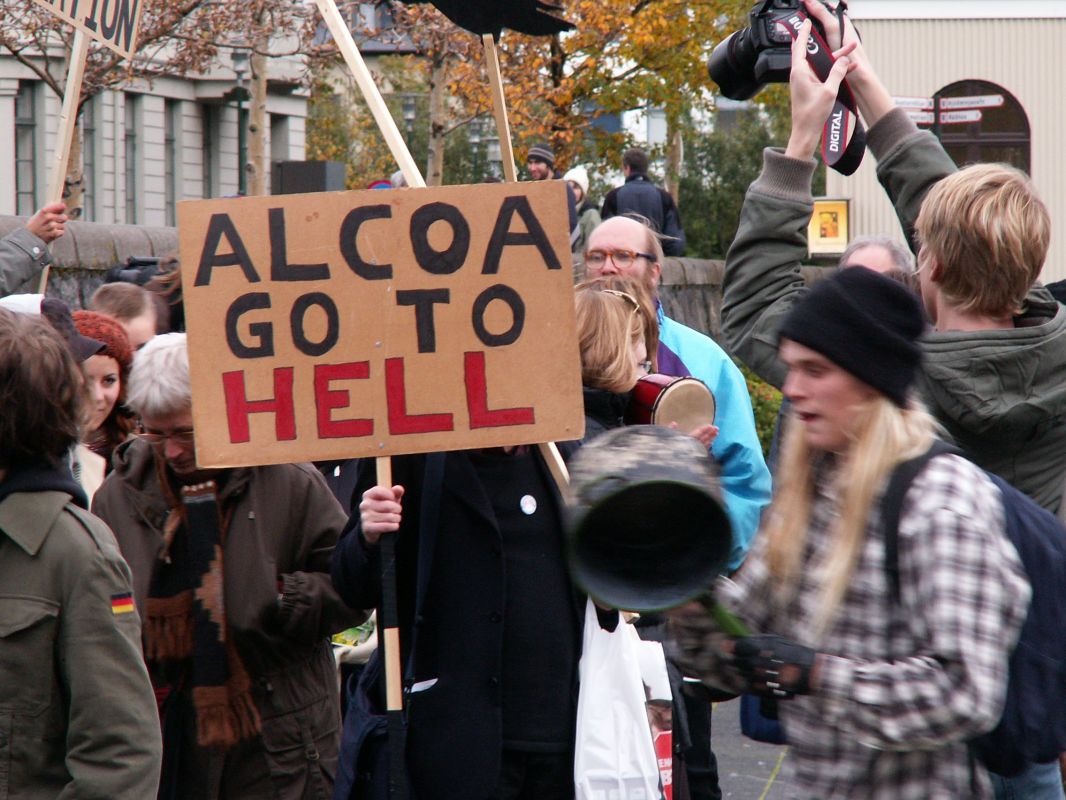
This time around Reykjavík was host to an International Conference on Anode Rodding Plants for Primary Aluminium Smelters. At the conference, which was largely funded by Icelandic tax payers’ money, Iceland was yet again being offered up for sale as a cheap country for aluminium smelting, while undesirable points of view were unwelcome.
So Saving Iceland decided to invite themselves
On the morning of 21 September delegates woke up to a noisy bunch of protestors standing outside the Hotel Nordica blowing whistles and horns and banging away on pots and drums, just to remind the delegates and their hosts that there is active and unfailing resistance to the systematic destruction of Icelandic nature and the increase in pollution of our environment.
Same day in the late afternoon the representatives of the most polluting industry in the world were treated with champagne and canapés at the Reykjavík Municipality. At the same time an International Transport week was being celebrated in Reykjavík; its stated purpose was “to raise awareness among the public on the necessity of reducing pollution caused by traffic”. Greenhouse gas emissions from the ALCOA smelter in Reyðarfjörður will be equal to that of 172.000 cars; the entire car-fleet of Iceland!
Together with NatureWatch and youngsters of Ungrót, Saving Iceland organized another noise protest outside the Municipality as the mayor welcomed delegates of the conference. A heavy police presence was deemed necessary to protect the polluting fat cats while they sipped champagne and listened to fawning speeches of Icelandic dignitaries. For two hours environmentalists put on street performances and vigorously banged on their drums. A large window on the side of the building gave the delegates a good view of the crowd and their banners.
The protestors were content with their ample supplies of green skyr (Icelandic dairy product very useful for splashing on poisoners of the earth!) and in the spirit of sharing offered the delegates to have some on their way out from the mayor’s visit. This generosity caused unexplained tremors amongst the cops and delegates alike. Perhaps bad memories from last June had something to do with it…
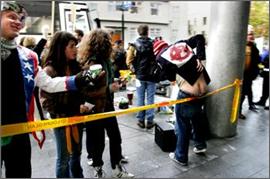
A 14 year old protestor was arrested for
mooning at the aluminium sophisticates!
23 September
Delegates of the conference visited the aluminium smelters at Straumsvík and Grundartangi. Saving Iceland went to the ALCAN factory to warn them what aluminium smelting can do to their health.
To indicate solidarity with the people who have suffered from ALCAN’s immoral and inhuman working practices around the world the protestors sang The Alcan Song:
“It’s ALCAN the Aluminium Man
The Aluminium Man with the Aluminium Plan
For making lots of aluminium
Out of other peoples land!
Will this Man of Aluminium
Realize what he’s done,
Once he’s done what he is about to start?
He’s got aluminium, but he’s got no heart!”
Meanwhile ALCAN’s flag was stamped on, torn and finally burnt.
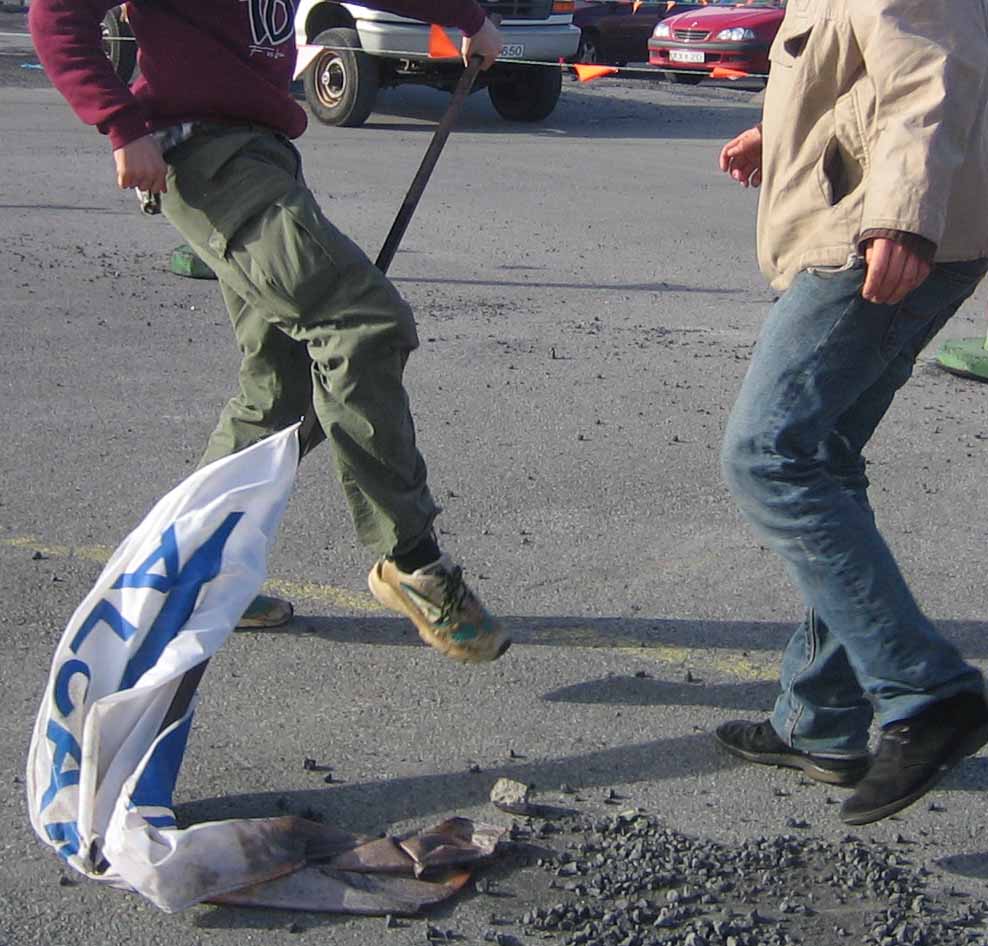
Yes, there was some dancing too
Two people were illegally arrested for throwing a harmless and perfectly legal smoke-bomb into an open field. One of them was arrested for driving a “stolen” car from the protest, even if the owner of the car gave immediate proof thathe had his permission to drive the car! Both were held for five hours and released without charge.
Below is a statement from the protestors:
“Today delegates of the 3rd International Conference on Anode Rodding Plants for Primary Aluminium Smelters in Reykjavík are due to visit the aluminium smelters at Straumsvík and Grundartangi. Little attention has been paid by the conference to the negative impact and harmful effects to people’s health of aluminium smelting and related types of processing.
At this conference, which is partly funded by Icelandic tax payers’ money, the Technological Institute of Iceland, City of Reykjavík, the Ministry of Industry, Icelandair and the National Power Company, Landsvirkjun are among the sponsors and participants, Iceland is yet again being offered up for sale as a cheap country to smelt aluminium, while undesirable points of view are unwelcome.
We wish to convey the message to the conference guests that there is active opposition in this country to the further build-up of heavy industry, and point out the impact that this build-up will have on the local people and on the environment of those of us who live on Faxaflói bay.
Our protest is designed to express our opposition to the proposed expansion of the aluminium smelters at Straumsvík (ALCAN) and Grundartangi (Century), as well as the construction of an anode factory at Katanes (R&D Ltd.) and yet another Century smelter at Helguvik. We find it wholly unacceptable that the Faxaflói bay should become the most highly polluted area in Northern Europe, yet this is what will happen if these plans go ahead.
The additional sacrifices of Iceland’s most precious natural jewels, the Ramsar protected wetlands of Thjorsarver and one of Europe’s most beautiful lakes, Langisjor, to facilitate the expansions of the ALCAN and Century smelters are completely unacceptable.
We also wish to show our solidarity with the people who have suffered from ALCAN’s immoral and inhuman working practices around the world; from the workers at Straumsvík who have contacted us to describe their unacceptable working conditions and the abuse of employees’ rights, to the inhabitants of the Kashipur district of India who have been fighting for twelve years against a planned bauxite mine and ALCAN aluminium plant which will force at least 20,000 people to leave their farm lands and will pollute their water supply (see www.saanet.org/alcant), not forgetting the residents of Hafnarfjördur in Iceland who are demanding a local referendum on the expansion of the ALCAN plant.
We urge the press to better inform themselves about the environmental impact of the planned build-up of heavy industry around Faxaflói bay, and equally about the record and working practices of the foreign companies that the Icelandic government continues to eulogize and acclaim as the saviors of Iceland.”
(Needless to say, there are no signs of the Icelandic media picking up the challenge and doing their home work for a change. Icelandic media is under the tight control of the triple headed hydra; The State, the nouveau riche and the bitter old rich. Investigative journalism in the aluminium republic belongs to the past.)
